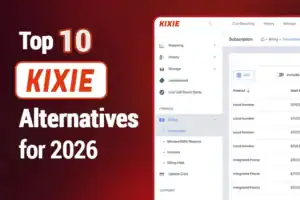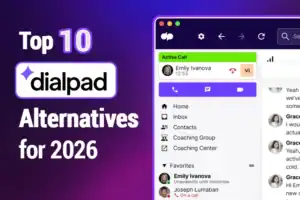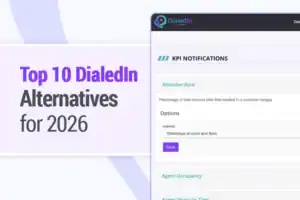When a customer makes a purchase, they don’t see departments. They see your brand.
They don’t know—or care—that sales and support teams have different goals, different systems, and often completely different ideas of what “success” looks like.
All they know is whether you delivered what you promised.
When sales and support work in silos, the result is broken trust. Customers hear one story during the sales process, only to experience something different after the contract is signed.
It’s a recipe for frustration, churn, and internal blame that erodes not just customer loyalty—but also your team’s morale.
- One Brand, One Promise: Customers expect consistency across sales and support—misalignment leads to broken trust.
- Misaligned Metrics: Sales chase revenue while support manages problems, creating conflict and customer frustration.
- Systemic Gaps: Disconnected tools and siloed communication cause poor handoffs and lost customer loyalty.
- Unified Solutions: Platforms like NobelBiz Omnichannel help bridge the gap, creating a seamless, trustworthy experience.
Let’s talk about why it happens, what it costs, and how smart organizations fix it.
💡Where Sales and Support Misalign
The disconnect between sales and support rarely happens on purpose. It happens because teams are trained, measured, and rewarded on different outcomes.
Sales teams are taught to push forward—to close deals, move fast, highlight the positives. It’s not that they want to mislead anyone. It’s that they’re working against a goal: revenue.
Support teams, on the other hand, are trained to fix problems. They see the messy reality: technical limitations, onboarding hiccups, miscommunications.
When these two teams don’t share information, strategies, or even basic customer insights, the result is a widening gap the customer falls right into.
⚠️ Promises Made, But Not Supported
It’s easy to overpromise when you’re rewarded for speed and volume, not long-term outcomes. A new feature that’s “coming soon” gets pitched like it’s ready. A service that technically exists—but requires heavy customization—is positioned as off-the-shelf.
The problem? Support teams have to pick up the pieces later.
They’re the ones on the phone trying to explain why the product can’t actually do what the customer was promised without weeks of extra work.
In the customer’s mind, it doesn’t matter whether it was sales or support that “messed up.”
It’s one company. One relationship. One broken promise.
🔥 Friction Between Teams → Frustration for Customers
The internal resentment between sales and support doesn’t stay hidden. It leaks into customer conversations—sometimes subtly, sometimes not.
Support reps vent their frustration without meaning to, with phrases like, “I’m sorry, they shouldn’t have told you that.”
Salespeople bristle when customers come back angry, wondering why support isn’t “handling it.”
Meanwhile, the customer just feels like they’re stuck between two departments that can’t get their story straight.
📉 Different KPIs, No Shared Accountability
This isn’t about bad employees. It’s about broken systems.
Sales teams are measured by revenue closed. Support teams are measured by how quickly they resolve problems.
But who’s measured by whether the customer actually got what they were promised?
Usually, no one.
Without a metric that forces both teams to focus on the customer’s end-to-end experience, silos grow deeper.
And customers slip through the cracks.
Salman Aslam
Director Support – Quality & Training at WORK Inc.
‘The support team at Nobelbiz understood our business requirements and we we’re able to push through seamlessly’
🌪 What Happens When Teams Aren’t Aligned?
When alignment breaks down between sales and support, it’s not just individual customer relationships that suffer—it’s your entire business ecosystem.
One of the fastest ways to bridge the gap between sales and support is through better system integration. Tools like the NobelBiz Omnichannel Contact Center allow teams to work from a single unified platform, with complete customer context—no more lost handoffs, no more fractured experiences. When agents have full visibility into the customer’s journey from first touchpoint to ongoing support, it’s easier to keep promises and solve problems faster.
“When sales and support teams move in different directions, it’s the customer relationship that breaks down. Alignment isn’t optional anymore—it’s the foundation for trust, loyalty, and growth.”- Mike Mcguire, Chief Revenue Officer at NobleBiz
🛑 Lost Trust and Poor Follow-Through
One broken promise can undo a dozen good experiences.
And today’s customers don’t just walk away quietly. They leave reviews, they warn friends, they switch vendors—fast.
Not after a series of failures. After one. It’s that fragile.
When sales and support teams aren’t aligned, even your best marketing campaigns can’t save you from a bad reputation built one frustrating handoff at a time.
Trust isn’t just about promises kept—it’s also about privacy respected. NobelBiz offers critical tools like Call Labeling and Blocking Protection and Phone Number Reputation Management to help businesses protect their communications and maintain customer trust from the first interaction onward.
🧩 Customers Get Caught in the Middle
Customers shouldn’t have to explain their situation three different times to three different people.
They shouldn’t have to argue about what they were promised.
They shouldn’t have to beg for someone to “own” the issue.
And when it comes to customer calls, voice quality matters. A missed word, a garbled apology—these small things make big impressions. A reliable service like the NobelBiz Voice Carrier Network ensures every call is crystal clear, helping agents sound professional and keeping communication frustrations to a minimum.
When internal handoffs are messy, the customer does more work to get less support—and that’s when loyalty breaks for good.
Related Article
⚙️ Internal Blame and Morale Problems
Misalignment isn’t just bad for CX. It’s poison for your internal culture.
Support agents feel like scapegoats, constantly apologizing for promises they didn’t make. Salespeople feel micromanaged or second-guessed. Managers end up refereeing finger-pointing matches instead of building strategy.
And when your teams don’t trust each other, the cracks show externally.
It becomes harder to recruit top talent. Harder to retain your best people. Harder to move forward with any momentum.
Part of the internal frustration comes from outdated, disconnected tech. With a solution like NobelBiz Cloud Contact Center, businesses can centralize operations, making collaboration between sales and support teams smoother and reducing the constant friction that eats away at morale.
Brayan Carpio
Senior Call Center Manager, Call4You Marketing
🏗 How to Align Sales and Support Around the Customer
You can’t fix this with another meeting.
You fix it by building systems that force collaboration, not competition.
🗣 Share Key Feedback and Stories
Support hears the customer’s real frustrations after the sale closes. That feedback is gold—but only if sales teams hear it too.
Make it a practice to regularly share real examples of customer feedback across teams.
Not to point fingers.
But to learn. To refine messaging. To understand where expectations aren’t matching reality—and fix it before it happens again.
🛡 Build a Common Definition of Success
Sales should celebrate closing deals. Support should celebrate solving problems.
But both teams should ultimately be judged by one shared success: Did the customer get what they expected, and are they staying loyal?
Tie incentives not just to revenue, but to retention rates, upsell rates, and customer satisfaction scores.
When both teams win together, behavior changes—fast.
Companies with strong sales and support alignment achieve 36% higher customer retention rates.
📢 Let Support Help Shape Sales Messaging
Support agents know exactly what customers misunderstand, overestimate, or get frustrated about.
That knowledge shouldn’t stay hidden in ticket notes—it should influence how you sell.
Before launching a new offer, update your pitch decks based on feedback from frontline support.
Let reality—not optimism—drive the story you tell customers.
“Your support team hears the raw, unfiltered truth from customers every day. That feedback isn’t noise—it’s gold. If you’re not building it into your sales strategy, you’re missing the biggest opportunity to improve.” – Christian Montes, Chief Operating Officer at NobelBiz
Either you kept your promise—or you didn’t.
Internally, it’s easy to blame different teams, different systems, different KPIs.
But from the outside, there’s only one brand. One experience. One shot at loyalty.
When sales and support teams are aligned—sharing information, shaping each other’s work, and caring about the full customer journey—you don’t just win more deals.
You keep more customers. You build more trust.
You grow a business that doesn’t just sell dreams—but delivers them.
Because at the end of the day, the companies that win aren’t the ones with the flashiest pitches.
They’re the ones that keep their word—and make every customer feel like they matter.
FAQs About The Cost of a Divided Call Center
Discover how NobelBiz helps call centers maximize customer engagement, boost answer rates, and ensure compliance with industry-leading solutions.

Andrei is an experienced marketing professional specializing in propelling growth for both B2B and B2C companies. Proficient in streamlining marketing operations and enhancing lead and customer experiences through SEO and marketing techniques.






